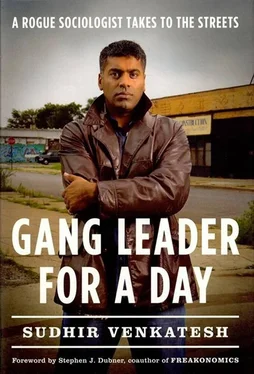“But sometimes it doesn’t go so well, Sudhir,” said one of the other women, Sarina, who liked to be the voice of reason. She stared down Tanya as she spoke. Sarina had three children, the fathers of whom were, respectively, in jail, dead, and unwilling to pay child support. So she, too, had taken in boarders. “I remember when my brother came into the house, he started dealing dope and they caught him. Almost took my lease away.”
“Yeah, but that’s just because you didn’t pay the building manager enough money,” Tanya said. “Or I think that it was because you didn’t sleep with him!”
“Well, I’m not doing either one of those things,” Sarina said in a moralistic tone, shaking her head.
“You got some nerve,” interrupted Keisha. “Sarina, you put your ass out there for any man who comes looking.” At twenty-six, Keisha was one of the oldest women in the group. Even though she had grown angry with me for sharing information about hustlers with Ms. Bailey, she hadn’t held the grudge for long. She had two daughters and was the best writer in the group, a high-school graduate now planning to apply to Roosevelt College. “Hell, there ain’t no difference between some ho selling her shit and you taking some man in your house for money.”
“Hey, that’s survival!” Tanya said. “I mean, that’s what we’re here to talk about, right?”
“Okay,” I jumped in, trying to establish some order. “What’s the best way for you to take care of whatever you need to? Give me the top ten ways you survive.”
Sarina began. “Always make sure you know someone at the CHA you can turn to when you can’t make rent. It helps, because you could get evicted.”
“Yeah, and if you have to sleep with a nigger downtown, then you got to do it,” said Keisha. “Because if you don’t, they will put your kids on the street.”
Sarina went on, ignoring Keisha. “You got to make sure you can get clothes and food and diapers for your kids,” she said. “Even if you don’t have money. So you need to have good relations with stores.”
“Make sure Ms. Bailey’s always getting some dick!” Keisha shouted, laughing hard.
“You know, one time I had to let her sleep with my man so I wouldn’t get kicked out of the building,” Chantelle said.
“That’s awful,” I said.
“Yeah,” Chantelle said. “And he almost left me, too, when he found out that Ms. Bailey could get him a job and would let him stay up there and eat all her food.” Chantelle was twenty-one. Her son had learning disabilities, so she was struggling to find a school that could help him. She worked part-time at a fast-food restaurant and depended on her mother and grandmother for day care and cash.
Chantelle’s hardships weren’t uncommon in the projects. Unfortunately, neither was her need to appease Ms. Bailey. The thought that a tenant had to let the building president sleep with her partner was alarming to me. But among these women such indignities weren’t rare. To keep your own household intact, they said, you had to keep Ms. Bailey happy and well paid. As I heard more stories similar to Chantelle’s, I found myself growing angry at Ms. Bailey and the other LAC officials. I asked Chantelle and the other women why they didn’t challenge Ms. Bailey. Their answer made perfect sense: When it became obvious that the housing authority supported a management system based on extortion and corruption, the women decided their best option was to shrug their shoulders and accept their fate.
I found it unconscionable that such a regime existed, but I wasn’t going to confront Ms. Bailey either. She was too powerful. And so while the women’s anger turned into despair, my disgust began to morph into bitterness.
The women’s list of survival techniques went well beyond ten. Keep cigarettes in your apartment so you can pay off a squatter to fix things when they break. Let your child pee in the stairwell to keep prostitutes from congregating there at night. Let the gangs pay you to store drugs and cash in your apartment. (The risk of apprehension, the women concurred, was slim.)
Then there were all the resources to be procured in exchange for sex: groceries from the bodega owner, rent forgiveness from the CHA, assistance from a welfare bureaucrat, preferential treatment from a police officer for a jailed relative. The women’s explanation for using sex as currency was consistent and pragmatic: If your child was in danger of going hungry, then you did whatever it took to fix the problem. The women looked pained when they discussed using their bodies to obtain these necessities; it was clear that this wasn’t their first-or even their hundredth-preference.
“Always know somebody at the hospital,” Tanya blurted out. “Always have somebody you can call, because that ambulance never comes. And when you get there, you need to pay somebody, or else you’ll be waiting in line forever!”
“Yes, that’s true, and the people at the hospital can give you free baby food,” Sarina said. “Usually you need to meet them in the back alley. And I’d say you should keep a gun or a knife hidden, in case your man starts beating you. Because sometimes you have to do something to get him to stop.”
“You’ve had to use a knife before?” I asked. No one had spoken or written about this yet. “How often?”
“Many times!” Sarina looked at me as if I’d grown up on Mars. “When these men start drinking, you can’t talk to them. You just need to protect yourself-and don’t forget, they’ll beat up the kids, too.”
Keisha started to cry. She dropped her head into her lap and covered up so no one could see. Sarina leaned over and hugged her.
“The easiest time is when they’re asleep,” Tanya said. “They’re lying there, mostly because they’ve passed out drunk. That’s when it runs through your mind. You start thinking, ‘I could end it right here. I could kill the motherfucker, right now. Then he can’t beat me no more.’ I think about it a lot.”
Keisha wiped her eyes. “I stabbed that nigger because I couldn’t take it no more. Wasn’t anybody helping me. Ms. Bailey said she couldn’t do nothing, the police said they couldn’t do nothing. And this man was coming around beating me and beating my baby for no reason. I couldn’t think of any other way, couldn’t think of nothing else to do…”
She began to sob again. Sarina escorted her to the bathroom.
“She sent her man to the hospital,” Tanya quietly explained. “Almost killed him. One night he was asleep on the couch-he had already sent her to the hospital a few times, broke her ribs, she got stitches and bruises all over her body. She grabbed that knife and kept putting it in his stomach. He got up and ran out the apartment. I think one of J.T.’s boys took him to the hospital. He’s a BK.”
Because the boyfriend was a senior gang member, Tanya said, J.T. refused to pressure him to stop beating Keisha. She still lived in fear that the man would return.
One day Ms. Bailey called and asked that I come to a building-wide meeting with her tenants. She hadn’t invited me to such a meeting in more than a year, so I figured something important was afoot.
I hadn’t been keeping up with Ms. Bailey’s tenant meetings in part because I’d already amassed sufficient information on these gatherings and also because, in all honesty, I’d grown uncomfortable watching the horse-trading schemes that she and other tenant leaders used to manage the community.
My own life was also starting to evolve. I had moved in with my girlfriend, Katchen, and we were thinking about getting married. Visiting our relatives-mine in California and hers in Montana- took time away from my fieldwork, including much of our summers and vacations. My parents were thrilled, and they pushed me to think seriously about starting a family along with a career. Katchen was applying to law school; neither of us was ready for children just yet.
Читать дальше












